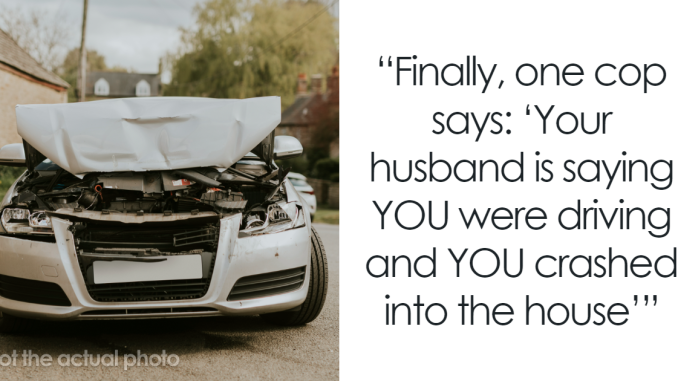
A person who takes accountability for their actions can be trusted to be transparent, honest, and dependable. These traits are essential in relationships where being able to rest assured about your partner is a number one priority. However, not all people can admit their wrongdoings, which come out sooner or later in the form of a bright red flag.
Unfortunately for redditor FancyFranny33, this trait of her partner appeared quite late in the relationship. It happened one night when her husband got way too intoxicated and drove into a house. Wanting to escape the consequences, he tried shifting the blame on his wife, which failed spectacularly and put their marriage in jeopardy.
Not all people are capable of admitting their wrongdoings, which can be quite a red flag in relationships
Image credits: Rawpixel / envatoelements (not the actual photo)
This husband, for example, instead of taking accountability for his drunk driving, tried blaming it on his wife
Image credits: voronaman111 / envatoelements (not the actual photo)
Image credits: FancyFranny33
Dread of failure, fright of being judged, and anxiety about consequences can push people to avoid accountability
We all make mistakes now and again but why is it so hard to admit them? One primary reason for this is fear. Dread of failure, fright of being judged, anxiety about consequences—these all can contribute to the apprehension of accepting responsibility.
When we do something wrong, our innate instinct is to protect ourselves from negative outcomes. That’s why some people might deny, deflect, or even lie about their misdeeds. The idea of making a mistake can be so frightening to some individuals that they go to great lengths to avoid it.
Another thing that plays a big part in this is our ego. Accepting responsibility requires us to admit that we aren’t perfect, which can be tough to acknowledge for many. Our sense of self-worth protects our self-image and self-esteem and admitting faults can feel like a hit to our identity. Being unable to overstep this psychological barrier is often why some people can’t hold themselves accountable.
Such behavior can also stem from past traumas like abuse, criticism, betrayal, rejection, neglect, blame, punishment, or gaslighting. Without even realizing it, people who have gone through these things may find themselves responding in the same ways they were treated. Over time, it becomes a coping mechanism used to instinctively survive, especially when they do something wrong.
Instead of taking responsibility for their actions, people often find ways to blame someone else
So instead of taking responsibility for their actions, these people often find ways to blame someone else. In relationships, it’s called blame-shifting and can be harmful to couples as it repeats manipulative and controlling behaviors.
“Blame shifting in toxic relationships is a manipulative tactic used by one party to avoid taking responsibility for their actions or behavior. It involves the person who is at fault deflecting blame onto their partner, making them feel guilty or responsible,” explains Sherry Gaba, LCSW, a licensed psychotherapist and life coach.
This often happens by detracting the focus of the conversation from them and shifting the attention and blame to their partner. In relationships where one significant other is held responsible for another’s faults, it can erode self-esteem and self-trust.
Breaking out of the destructive blame cycle is possible, but it requires emotional maturity and communication. The couple can try a different method of communication than they did before, as a shift in perspective can be impactful.
“It’s never easy, and it can feel defeating—even painful—especially when the emotional wounds are still fresh. However, one simple shift in perspective has the power to transform the value and meaning of a relationship,” says Dr. Edward Ratush, a sex therapist and board-certified psychiatrist.
Leading the conversation with empathy and understanding that the partner is most likely not doing it out of spite but rather responding out of their trauma or reflex might help to chip away at the situation and move forward. If the couple can’t do it alone, they might want to reach out to couples counseling, where trained experts aid in healing individuals and couples.
The couple should also make accountability a priority and learn to apologize when they make mistakes. During this, active listening should be involved, which can help understand the other partner’s perspective and prevent misunderstandings that might arise from assuming or misinterpreting each other’s words.
The author provided more information in the comments
The readers advised the woman to run for the hills
The post Man Thinks It Makes More Sense To Pin His DUI Crash On Wife, Ends Up In Jail Instead first appeared on Bored Panda.
